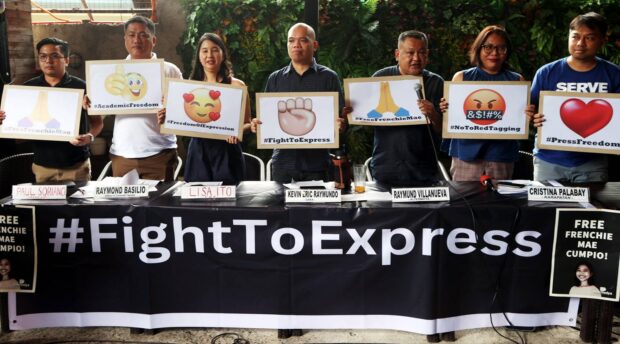Watchdogs warn freedom of expression in PH at risk

Media groups, artists, press freedom, and freedom of expression advocates hold placards during a press conference at a restaurant in Quezon City, on Jan. 16, 2024. The group shares the issues on attacks on freedom of expression and opinion in the country in time for the official visit of UN Special Rapporteur on Freedom of Expression and Opinion Irene Khan. The group also launched #FightToExpress, urging Khan to investigate the dangerous patterns of violations of the people”s freedom of expression. (Photo by NIÑO JESUS ORBETA / Philippine Daily Inquirer)
MANILA, Philippines — Two international watchdogs warn that freedom of expression continues to be at risk in the Philippines.
Following the visit of United Nations Special Rapporteur (UNSR) Irene Khan to the country, human rights advocate Amnesty International on Friday urged President Ferdinand Marcos Jr. to take immediate action to protect the right to freedom of expression.
Amnesty Philippines director Butch Olano said the government should not wait until the UN Human Rights Council session in June 2025 to implement Khan’s recommendations.
“For human rights to be fully realized, the Marcos administration should commit to alleviating the current human rights situation in the country by acknowledging Khan’s preliminary recommendations now, not wait for the UN session in 2025, to take concrete steps to ending the repression of the right to freedom of expression, impunity, and harassment of human rights defenders, journalists and student activists,” Olano said in a statement.
READ: UN rapporteur on freedom of expression arrives in PH
Article continues after this advertisementOlano claimed that the human rights situation in the country has worsened under Marcos, who took office in 2022, and that the government should acknowledge and address the repression of dissent and freedom of expression.
Article continues after this advertisement“Two years into this administration, human rights organizations have noted rising cases of attacks against human rights defenders, repression of dissent, and freedom of expression. The worsening situation is getting more difficult to cover up, [Khan’s] mission report will be a testament to that. This should be a challenge to the government to fulfill [its] obligation to uplift human rights in the country and protect the individuals defending it,” Olano noted.
End ‘red-tagging’
Human Rights Watch, another international watchdog, also expressed concern over the continued practice of “red-tagging” under Marcos and urged the president to end this.
In its World Report 2024, released in January, the group said that “Red-tagging” has placed activists and critics at serious risk of physical attacks and other abuses.
“The Marcos administration should end the pernicious practice of ‘Red-tagging’ government opponents,” said Bryony Lau, deputy Asia director at Human Rights Watch.
“Red-tagging is a form of harassment that can lead to deadly abuses, and runs counter to Marcos’ pledge to promote human rights,” he added.
At the end of her 10-day visit to the country on Friday, Khan told reporters that the administration has done a better job than its predecessor in terms of respect for human rights.
She acknowledged that the country has improved from its status when former President Rodrigo Duterte was still in charge, as the Marcos government shows a willingness to cooperate with international bodies.
Peace-building strategies
However, Khan also admitted that more effort was needed to truly go against the past.
Khan, the third UNSR to visit the country under the Marcos administration, pointed out that dealing with the “grave and deep-seated human rights problems” in the country would require “fundamental and sustained reforms and a clear commitment to accountability.”
“At home and abroad, there is an expectation that the government will build on the steps it has already taken to embark on more significant legal, policy, and institutional changes. It is only by doing so that it will reaffirm the image of the Philippines as a forward-looking, vibrant democracy, committed to human rights and the rule of law,” she added.
In her exit report, Khan recommended that the government disband its anti-communist task force, which has been blamed for endangering the lives and safety of human rights defenders, activists, independent journalists, and the opposition by Red-tagging them.
According to her, the abolition will address the “critical drivers” of Red-tagging—the practice of branding individuals as communists — and also allow the administration to advance its peace-building strategies.
Government officials, however, rejected this recommendation, arguing that it was not yet time to dismantle the task force credited with helping defeat the insurgents.